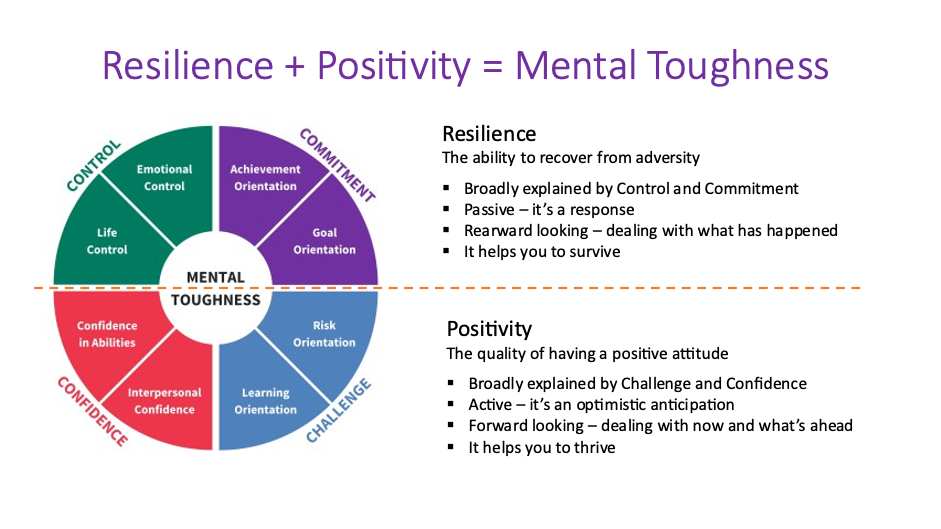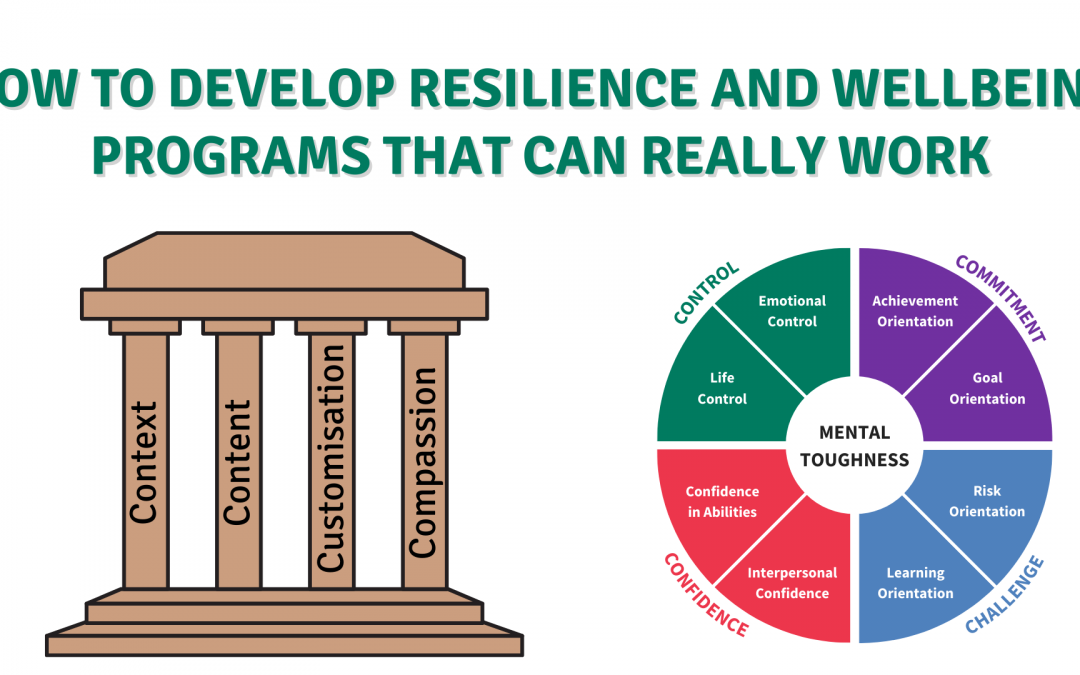The 4Cs approach to developing the 4Cs of Mental Toughness
A recent (March 2023) paper from Oxford University* found that, resilience and wellbeing programs in 143 UK organisations employing almost 28,000 people failed to deliver satisfactory results and that some were even negative in impact. The range of interventions included coaching, resilience apps, mindfulness and resilience training.
An earlier study on wellbeing programs in the Dutch Police Service, using the MTQ+, by Edwin van der Meulen et al**. found similar.
This does not mean that resilience, mental toughness, or wellbeing programs cannot or do not work. Many do deliver and, in our work, we believe, and generally can evidence, that the programs can deliver tangible benefits in terms of wellbeing, performance and change of attitude with all that means for the individual AND the organisation.
So why do so many programs fail?
The two studies are hugely impressive. They both point to the same things.
Firstly, although the programs are nominally directed at the individual they are not customised. They do not take into account the individual needs of participants and seek to address them. Both studies come to the same conclusion using the same language “One size doesn’t fit all”.
Surely we know this! It is so often mentioned. It appears that many practitioners may know this, but they do not understand it.
The use of the mental toughness concept and measure to create awareness about an individual’s mental responses can address this.
Secondly, in focusing on the individual, there is often little change in the organisation itself. So, all the impetus for change is directed at the individual. Unfortunately, the leadership of the organisation often does not change its behaviour and the many sources of stress and pressure are often not eliminated or even reduced. In extreme circumstances, employees can feel that “it’s their fault” that they are stressed.
Again, this is something we know. Again, the mental toughness concept applies to both the organisation and the individual and can be the “missing link”.
What is mental toughness?
More detailed information about the eight-factor model of mental toughness can be found on the AQR International website. Mental Toughness is a personality trait which describes how individual’s respond mentally to stress, pressure, opportunity and challenge. It can be assessed through the MTQPlus psychometric.
This can be aggregated to form a picture of the organisation’s mental toughness.
Incredibly well evidenced, the concept is formed of four constructs called the 4Cs – Control, Commitment, Challenge and Confidence. Broadly these describe Resilience and Positivity which combine to describe Mental Toughness. A simple representation is shown at the foot of this article.
At its most basic level, there are over 40,000 combinations of profiles. As a means of diagnosing an individual’s response to stressors and therefore their particular development needs, it has the potential to be a fine instrument.
What is needed for a much better chance of success?
This is where the other 4Cs come in – Customisation, Context, Care and Compassion.
Customization – the research shows that when this is missing, the intervention fails. The mental toughness concept and the MTQ measures provide a remarkable capability to both understand the individual and to enable self-awareness in the individual about why, mentally, they thrive or struggle in their situations. That includes both work and life.
Context – you cannot change only one aspect of a situation where stressors create problems. It is important to understand where the sources of stress and pressure in the organisation are – whether these are caused by people or processes, and to purposefully set about reducing or eliminating them.
The mental toughness concept and measure can help here and useful connect the individual perspective with the organisational perspective.
Care – an initiative which purports to help the individual must be delivered in a way that the employee believes that this is primarily for their benefit and that the initiator genuinely cares for their wellbeing. This is not a procedural challenge it is a leadership challenge.
Compassion – Again a leadership issue, this requires that the leaders understand how employees respond to different pressures and how they respond to different initiatives to alleviate these – and be prepared to adjust these as they learn which works best for which people.
For those who like tick boxes, if you can tick all four boxes, you stand a very good chance of success and improving wellbeing and that outcome – performance- for everyone’s benefit.
For information about becoming a licensed user of the MTQ suite of measures contact: headoffice@aqrinternational.co.uk
The MTQPlus measure is available in fourteen languages, accessible to more than 2/3rds of the world’s population.
Completion of the AQR Licensed user training programme is recognised by EMCC and ICF for CPD purposes.

**https://link.springer.com/article/10.1007/s11896-017-9247-8


